|
|
|
Sort Order |
|
|
|
Items / Page
|
|
|
|
|
|
|
| Srl | Item |
| 1 |
ID:
141282
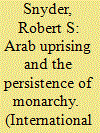

|
|
|
|
|
| Summary/Abstract |
The Arab uprising that began in 2010 saw the fall of rulers in states that had republican governments, yet the monarchs in their states survived. This is ironic in light of the fact that many monarchs throughout history have been vulnerable to revolutions. What explains this discrepancy? Although the literature has emphasized the impact of petrodollars in preserving the rule of the monarchs, this article stresses ideological and institutional factors. Like the Soviet Union's embrace of Marxism–Leninism, the Arab republics had regimes based on the failed ideology of revolutionary nationalism. Although revolutionary nationalism, which fused the nation and state, declined by the late 1960s, it left an institutional legacy that made it difficult for the republican states to change. On the contrary, in defining themselves in opposition to revolutionary nationalism, the monarchs provided for security and stability in making themselves somewhat immune to transnational revolutionary movements like the Arab uprising. In differentiating the state from the nation, the monarchs, paradoxically, showed more respect for different societal interests within the nation than the republican rulers.
|
|
|
|
|
|
|
|
|
|
|
|
|
|
|
|
| 2 |
ID:
141278
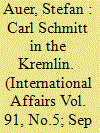

|
|
|
|
|
| Summary/Abstract |
The protracted crisis in Ukraine has exposed fundamental political differences between leaders in western Europe and their counterparts in Russia. The very existence of the European Union was meant to have refuted geopolitics as a useful theoretical lens through which to view power relations in Europe. After all, the European project is based on the idea that boundaries no longer matter and that national sovereignty is obsolete. And yet, geopolitics remains critically important—certainly for Europe's potential enemies, but also for Europe itself. It is poignant that to advance our understanding of this new constellation we are well served to turn to the insights of a classic, if hugely controversial, German political thinker: Carl Schmitt. Schmitt's political philosophy is relevant in three aspects. First, as a source of inspiration—even if only indirectly—for the contemporary Russian political establishment. Second, the behaviour of Putin's Russia, particularly since 2008, can be best understood through some of the key concepts that preoccupied Schmitt: sovereignty, the political and geopolitics. Third, Schmitt's philosophy can serve as a point of departure for reflecting on the possibility of a more robust response by Europe to the Russian intervention in Ukraine. What Europe needs is a more hard-nosed realist approach, which recognizes that Russia's expansionist ambitions can only be constrained by its own readiness and willingness to deploy power both politically and, if necessary, even militarily.
|
|
|
|
|
|
|
|
|
|
|
|
|
|
|
|
| 3 |
ID:
141283
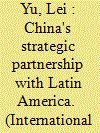

|
|
|
|
|
| Summary/Abstract |
China has over the last two decades been committed to creating a strategic partnership with Latin American states by persistently extending its economic and political involvement in the continent. China's efforts in this regard reflect not only its desire to intensify its economic cooperation and political relations with nations in Latin America, but also its strategic goals of creating its own sphere of influence in the region and enhancing its ‘hard’ and ‘soft’ power in order to elevate China's status at the systemic level. With access to Latin American markets, resources and investment destinations, China may sustain its economic and social progress that bases its long cherished dream of restoring its past glory of fuqiang (wealth and power) and rise as a global power capable of reshaping the current world system. The enormous economic benefits deriving from their economic cooperation and trade may persuade Latin American nations to accept the basic premise of China's economic strategy: that China's rise is not a threat, but an opportunity to gain wealth and prosperity. This will help China gain more ‘soft’ power in and leverage over its economic partners in Latin America, and thereby help it to rise in the global power hierarchy.
|
|
|
|
|
|
|
|
|
|
|
|
|
|
|
|
| 4 |
ID:
141285


|
|
|
|
|
| Summary/Abstract |
Diamonds are forever. But what of the definition of conflict diamonds used by the Kimberley Process (KP)? Despite the fact that civil society has raised attention to the cloudy issue of state-perpetrated diamond-related human rights abuses throughout the past decade, the continued longevity of the central definition around which the Kimberley Process revolves still appears to be a crystal-clear fact. As it turns out, calls to broaden the scope of the conflict diamond definition have not been successful because several discourse manipulations within the KP have had formative effects on other actors' identities and interests. Discourse spacing—the strategic allocation of ‘appropriate’ spaces for certain discourses within a particular institutionalized setting—has been strategically employed in an attempt to place boundaries on the redefinition discourse. By claiming that addressing human rights abuses lies beyond the mandate of the KP, several KP participant states have sought to convince others that discussing redefinition has no place on the KP reform agenda. Discourse timing has also been key, where numerous African states' perceptions of redefinition were influenced by accusations of neo-colonial intent on the part of western KP participant states that stemmed from a sanctions debate that was taking place parallel to the redefinition debate. The article finds that these two occurrences, alongside the KP's consensus-based decision-making structure and several KP participant states' fears about setting a human rights precedent, have obstructed the road to the redefinition of conflict diamonds.
|
|
|
|
|
|
|
|
|
|
|
|
|
|
|
|
| 5 |
ID:
141279


|
|
|
|
|
| Summary/Abstract |
This article examines how, in a global strategic context presided by the rise of Asia and the US rebalance towards that region, Europeans are contributing to transatlantic burden-sharing—whether individually or through the EU/NATO. As Asian powers reach westward and the US shifts its strategic priorities eastward, classical geostrategic delimitations become gradually tenuous. Particularly important are the ‘middle spaces’ of the Indian Ocean, central Asia and the Arctic, in that they constitute the main avenues of communication between the Asia–Pacific and the European neighbourhood. The article seeks to understand how evolving geostrategic dynamics in Europe, the ‘middle spaces’ and the Asia–Pacific relate to each other, and how they might impinge on discussions on transatlantic burden-sharing. It is argued that the ability of Europeans to contribute to a more equitable transatlantic burden-sharing revolves around two main tenets. First, by engaging in the ‘middle spaces’, Europe's key powers and institutions are helping to underpin a balance of power in these regions. Second, by stepping up their diplomatic and economic role in the Asia–Pacific, strengthening their security ties to (US) regional allies and maintaining an EU-wide arms embargo on China, Europeans are broadly complementing US efforts in that key region. There are a number of factors that stand in the way of a meaningful European engagement in the ‘middle spaces’ and the Asia–Pacific, including divergent security priorities among Europeans, the impact of budgetary austerity on European defence capabilities and a tendency to confine foreign policy to the immediate neighbourhood. The article discusses the implications of those obstacles and outlines some ways in which they might be overcome.
|
|
|
|
|
|
|
|
|
|
|
|
|
|
|
|
| 6 |
ID:
141286


|
|
|
|
|
| Summary/Abstract |
Russian President Vladimir Putin claims that his country's annexation of Crimea in March 2014 was partly in response to NATO enlargement. NATO leaders counter that eastern enlargement is not a cause of the Ukraine crisis, and they argue that enlargement does not threaten Russia, but rather it creates stability for all of Europe. This article examines the history of NATO–Russian tensions over enlargement, considers how NATO's enlargement policy factored into the Ukraine crisis, and reviews options for the future of enlargement. Drawing on diplomatic history and geopolitical theory, the article explains Russia's persistent hostility towards NATO's policy of eastward expansion and highlights NATO's failure to convert Russia to its liberal world-view. The alliance's norm-driven enlargement policy has hindered the creation of an enduring NATO–Russia cooperative relationship and helped fuel the outbreak of conflict in Georgia and Ukraine. In light of this, NATO should alter its current enlargement policy by infusing it with geopolitical rationales. This means downgrading the transformative and democratization elements of enlargement and, instead, focusing on how candidate countries add to NATO capabilities and impact overall alliance security. A geopolitically-driven enlargement policy would prioritize countries in the Balkan and Scandinavian regions for membership and openly exclude Georgia and Ukraine from membership. Ultimately, this policy would have the effect of strengthening NATO while giving it more flexibility in dealing with Russia.
|
|
|
|
|
|
|
|
|
|
|
|
|
|
|
|
| 7 |
ID:
141287
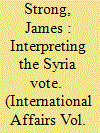

|
|
|
|
|
| Summary/Abstract |
This article presents three distinct interpretations of how parliamentary war powers affect British foreign policy more generally, based on a detailed analysis of the debate preceding the vote in parliament in August 2013 on whether Britain should intervene in the Syrian civil war. The first interpretation treats parliament as a site for domestic role contestation. From this perspective, parliamentary war powers matter because they raise the significance of MPs' doubts about Britain's proper global ‘role’. The second interpretation treats parliament as a forum for policy debate. There is nothing new about MPs discussing international initiatives. But now they do more than debate, they decide, at least where military action is involved. From this perspective, parliamentary war powers matter because they make British foreign policy more cautious and less consistent, even if they also make it more transparent and (potentially) more democratic in turn. The final interpretation treats parliament as an arena for political competition. From this perspective, parliamentary involvement exposes major foreign policy decisions to the vagaries of partisan politicking, a potent development in an era of weak or coalition governments, and a recipe for unpredictability. Together these developments made parliament's war powers highly significant, not just where military action is concerned, but for British foreign policy overall.
|
|
|
|
|
|
|
|
|
|
|
|
|
|
|
|
| 8 |
ID:
141281


|
|
|
|
|
| Summary/Abstract |
The Israeli-Palestinian conflict is of enormous interest to scholars and policy-makers, yet the internal Israeli policy debate on this issue is often overlooked or oversimplified. It is impossible to understand Israeli actions, the constraints on Israeli decision-makers and the trajectory of the conflict itself without a deeper understanding of this debate. This article presents a framework for categorizing the leading policy prescriptions currently advocated in Israel with respect to the Israeli-Palestinian conflict, drawing on public statements by politicians and leading think-tanks, and surveys of public opinion. The most discussed Israeli policy options are presented as follows: maintain the status quo; proactively move towards two states through either a negotiated agreement (Plan A) or unilateral separation (Plan B); or entrench Israeli presence in the West Bank through settlement expansion and annexation. Various public opinion surveys show the extent to which the Israeli public is divided on the issues, and an analysis of Israel's 2013–14 coalition demonstrates how all these approaches were being promoted simultaneously within the same cabinet, contributing to policy incoherence. The article concludes by outlining how Palestinian and international actions are influencing the Israeli debate, and argues that a move away from the status quo will require decisive Israeli leadership. It also suggests that third party attempts to impose terms for resolving the conflict that do not respond to concerns held widely in Israel are likely to fuel the argument of the status quo camp in the Israeli debate.
|
|
|
|
|
|
|
|
|
|
|
|
|
|
|
|
| 9 |
ID:
141284


|
|
|
|
|
| Summary/Abstract |
This article examines the ethics of using private security companies to undertake combat operations in modern conflict zones. Previous studies on this topic, including those that have drawn on the principles of just war theory, have, out of necessity, been highly speculative because they lacked a strong empirical basis on which to evaluate the behaviour of private security personnel during their operations. Indeed, most scholarship on the ethics of private security companies has relied on a handful of anecdotal examples that happened to receive extensive media coverage. In contrast, this article undertakes the first quantitative analysis of how well the employees of a dozen private security companies adhered to the jus in bello tenets of just war theory and also how their degree of adherence to these tenets affected their tendency to suffer friendly casualties during their security operations in Iraq. It finds that the employees of most of the firms under study exhibited a moderate or high level of adherence to the jus in bello principles of proportionality and discrimination during their security operations in Iraq. Moreover, it also finds that close adherence to these principles did not necessarily expose private security personnel to greater risk of suffering harm.
|
|
|
|
|
|
|
|
|
|
|
|
|
|
|
|
| 10 |
ID:
141280
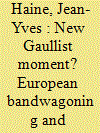

|
|
|
|
|
| Summary/Abstract |
The transatlantic partnership needs to be reassessed. Since the end of the Cold War, Europe has chosen to bandwagon with the United States and to outsource its security to Washington. Bandwagoning has serious consequences when the use of force is at stake: it may lead to entrapment, where weaker allies may be involuntarily dragged into a conflict. It may also lead to abandonment, where the dominant ally may choose to discard their vital security concerns. With the evolution of the international system towards a multipolar configuration, this strategy of bandwagoning is becoming increasingly costly for Europe while the dominant power, the United States, is progressively confronted by other competitors at the systemic level. These classic dilemmas attached to an asymmetric partnership are exacerbated in a multipolar configuration. In particular, the abandonment scenario may become more and more frequent precisely because there is competition—and thus potential costs—at the international level: the United States may leave Europe alone, not by choice but by necessity. The current crisis in Ukraine illustrates this shift: while some American leaders were keen to escalate the conflict by arming Ukraine, the Obama administration's commitment to the defence of Europe has been minimal and it has largely delegated the management of the crisis to the Europeans themselves. Washington had other and more important priorities. Strategic autonomy is not an option for Europe; it has become a reality, a Gaullist moment where Europeans will have to learn to think and act strategically for themselves.
|
|
|
|
|
|
|
|
|
|
|
|
|
|
|
|
| 11 |
ID:
141277
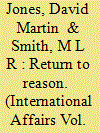

|
|
|
|
|
| Summary/Abstract |
Twenty-first-century political crises stretching from Europe to the Middle East and the Asia–Pacific have undermined the worldview that governed post-Cold War western thinking about a liberal end of history. This worldview assumed that shared norms and transnational institutions would transform the state based-order. In this context, the use of force is considered appropriate only for humanitarian ends meeting a set of predetermined axioms laid down in chapter 7 of the UN Charter. Yet for any strategy to be effective—in an international order subject to change—a clear political aim is required, which might deviate from the general rule. Preoccupied with universal postulates, legal normativism has lost sight of the particular. The argument put forth in this article is that the failure of contemporary western foreign policy in the twenty-first century to address this limitation or to prioritize political ends has led to strategic confusion from Afghanistan to Syria and Ukraine. In this context, it might be useful to reappraise the utility of abstract rationalist approaches to global governance and return instead to an earlier understanding of statecraft that avoided premature generalizations and treated norms as maxims of prudence rather than axioms requiring universal application.
|
|
|
|
|
|
|
|
|
|
|
|
|
|
|
|
|
|
|
|
|